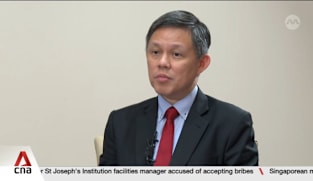Josephine Teo on Online Criminal Harms Bill
If the police have reasonable suspicion that an account on a social media service is being used for unlicensed moneylending activity, they can issue the service provider a Disabling Direction to prevent the post or page from reaching a person in Singapore, or an Account Restriction Direction to prevent it from interacting with people here. Similarly, someone who posts text or images inciting violence against people of a certain race can be served a Stop Communication Direction. Communications and Information Minister Josephine Teo cited these examples in Parliament on Wednesday (Jul 5) as she highlighted the key features of the Online Criminal Harms Bill. The Bill allows Directions to be issued to online service providers, entities or individuals for specified criminal offences. It also makes special provisions for scams and malicious cyber activities. Mrs Teo said such activities tend to unfold with great speed and scale and inflict great harms on the victims. She said the threshold to issue Directions should therefore be lower. For scams, the initial contacting and grooming of victims may not yet constitute a criminal offence or cross the threshold of reasonable suspicion. Mrs Teo said Singapore’s response needs to be “kiasu” and “extraordinarily careful". With a lower threshold, law enforcement would be able to issue Directions proactively, once such activities are detected, before an offence is committed. For instance, they can issue Access Blocking Directions to Internet Service Providers to prevent blank websites from being accessed by Singapore users, as well as App Removal Directions to remove the apps from Singapore app storefronts and third-party app stores. Mrs Teo also highlighted the need to involve online service providers in crime prevention as they have much more knowledge about what is happening on their platform. Such collaboration will be promoted through the Codes of Practice. “This Bill is calibrated to allow us to respond more effectively to online criminal harms, while enabling us to continue to enjoy the many benefits which the Internet has brought us,” she said.
If the police have reasonable suspicion that an account on a social media service is being used for unlicensed moneylending activity, they can issue the service provider a Disabling Direction to prevent the post or page from reaching a person in Singapore, or an Account Restriction Direction to prevent it from interacting with people here. Similarly, someone who posts text or images inciting violence against people of a certain race can be served a Stop Communication Direction. Communications and Information Minister Josephine Teo cited these examples in Parliament on Wednesday (Jul 5) as she highlighted the key features of the Online Criminal Harms Bill. The Bill allows Directions to be issued to online service providers, entities or individuals for specified criminal offences. It also makes special provisions for scams and malicious cyber activities. Mrs Teo said such activities tend to unfold with great speed and scale and inflict great harms on the victims. She said the threshold to issue Directions should therefore be lower. For scams, the initial contacting and grooming of victims may not yet constitute a criminal offence or cross the threshold of reasonable suspicion. Mrs Teo said Singapore’s response needs to be “kiasu” and “extraordinarily careful". With a lower threshold, law enforcement would be able to issue Directions proactively, once such activities are detected, before an offence is committed. For instance, they can issue Access Blocking Directions to Internet Service Providers to prevent blank websites from being accessed by Singapore users, as well as App Removal Directions to remove the apps from Singapore app storefronts and third-party app stores. Mrs Teo also highlighted the need to involve online service providers in crime prevention as they have much more knowledge about what is happening on their platform. Such collaboration will be promoted through the Codes of Practice. “This Bill is calibrated to allow us to respond more effectively to online criminal harms, while enabling us to continue to enjoy the many benefits which the Internet has brought us,” she said.



















